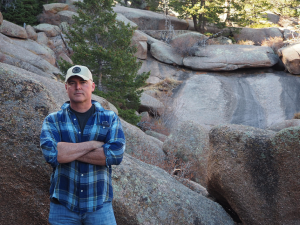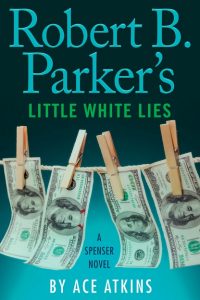 Ace Atkins is the bestselling author of 21 novels, including The Fallen and now, Little White Lies. Ace has been nominated for every major award in crime fiction, including the Edgar Award. A former newspaper reporter and football player at Auburn, Ace also writes essays and investigative pieces for several national publications including the Wall Street Journal, Garden & Gun, and Men’s Journal.
Ace Atkins is the bestselling author of 21 novels, including The Fallen and now, Little White Lies. Ace has been nominated for every major award in crime fiction, including the Edgar Award. A former newspaper reporter and football player at Auburn, Ace also writes essays and investigative pieces for several national publications including the Wall Street Journal, Garden & Gun, and Men’s Journal.
Little White Lies picks up on Robert B. Parker’s Spenser novels for which Ace was selected as the writer by the Parker estate. The story beings with Connie Kelly who thought she found her perfect man on an online dating site. She fell so hard for M. Brooks Welles, she wrote him a check for nearly $300,000 to be invested on her behalf. Soon afterwards, both her money and Welles are gone. When Spenser discovers everything about Welles was phony, it’s just the beginning of a trail leading from Boston to the backroads of Georgia, where deadly surprises await Spenser and his friend Hawk.
Before we talk about Little White Lies, some questions about Ace Atkins. Was there an event or influence in your early years that made you want to become a writer?
The biggest thing for me was I really loved books as a kid. I wasn’t just a causal reader. I really was obsessed with books. In high school, I became a book collector of rare editions and I was very into Ian Fleming’s James Bond novels, so it just fed into my wanting to write my own stories.
You obviously have a natural talent for storytelling, but you were also influenced by these early exposures. In your view, is becoming a writer an inborn trait or something one learns? Is it nature or nurture?
I’ve thought about that with my own kids. I think there are kids who tend to have a richer fantasy life than others. They seem to have more imagination and possess a creative tendency.
I think the most valid view is a writer has to have a little bit of both. There must to be talent and innate curiosity, but a writer should hone these abilities to translate what’s inherently in his mind on to the page. So, it’s a bit of DNA coupled with learning the craft.
You were a varsity football player at Auburn and became a journalist. How did that come about?
It wasn’t easy [Laughter]. My biggest motivator was I didn’t want to become a football coach. I majored in mass communications, studying screen writing, and also took English and Southern literature courses.
I had a friend who said ‘It you want to become a writer, the best place to do it is to go into the newsroom.’ I thought about people like Hemingway and Graham Greene and other writers I respected who honed their craft as journalists. I was living in Florida and took a job with the St. Petersburg Times. I was scraping by earning pennies writing stories. I’m not kidding, I was paid thirty bucks per story. If I got fifty bucks, it was a windfall. Eventually, I became a fulltime reporter.
It took a few years before I got my sea legs because I didn’t have a journalism background. It was also a bad time with the recession. Reporters were being laid off, but eventually, I became a staff writer at the Tampa Tribune. That experience was valuable because the editors helped me hone what I was doing and I became a much better writer.
How did your career as a journalist prepare you for writing fiction?
One of the things I see with amateur writers, or those who haven’t been in the news business as print journalists, is a failure to get to the point of a story. As a journalist, you learn that words are cheap, and that everything you put on the page is not magic. Having worked with some very tough news editors, I learned how to get to the point of a story. For instance, in a news story, I might have two-thousand quotes, but I had to decide which were the best quotes to use in a story. I learned the meaning of dialogue and which words had the most impact. I learned how to write good sentences and to write with clarity and color.
Those were the lessons that prepared me to become a fiction writer, drawing on my training and experiences writing news feature stories.
I understand Little White Lies is loosely based on an ex-FOX News pundit’s false CIA claims and other con men you covered as a journalist over the years. Will you talk about that?
I’ve always been fascinated by con men. Let me tell you something, Tampa and the St. Petersburg area of Florida are con man havens. Certain kinds of people who’ve screwed up go there to reinvent their lives.
I was really fascinated by Wayne Simmons. His story is relevant to today’s news cycles where people are debating what is truth versus what is fake news. People who watch news programs on television may not realize that what they’re seeing is programmed more for entertainment than for imparting accurate information.
This guy, Wayne Simmons, was able to work his way onto television shows claiming to have been a CIA analyst and officer. He was eventually ‘outed” by people who had actually worked for the CIA. He conned a woman out of a few hundred thousand dollars in a real estate scam.
I also ran into a story about a man I covered as a reporter. He’d worked a similar kind of scam with women all over Tampa. The CIA scam is the best one these people use. It’s the greatest go-to for con men because the CIA cannot confirm or deny employment. It can’t be verified or disproven. While I was working at the Tampa Tribune, I wrote about this guy and did a three-part series on con men.
Since Spenser never had to go up against a good con man case, I figured Little White Lies would involve this kind of scam. Years ago, I actually met Frank Abagnale, a reformed con man who was about to have a movie made about his exploits. Catch Me If You Can is based on his story. Another con man scam is someone claiming to have been a former Navy SEAL. I know a former SEAL who ‘outs’ about thirty of these guys every single day.
I’ve noticed that in Little White Lies and other books in the Spenser series, Spenser has a cynical and edgy sense of humor. Will you talk about the role of humor in thrillers and mysteries?
There’s humor in Spenser’s world view as originally written by Robert B. Parker. And, it’s somewhat consistent with my own view of things. Spenser is the same as he was in the 1970s. Ironically, I feel I have more in common with Spenser than with my own creation, Quinn Colson.
As for humor in thrillers and mysteries, when I pick up a book that doesn’t have a thread of humor in it, I have very little patience for it. I sense my patience dwindling as I get older. The writers I really respect, and who write with a nice helping of humor—for instance, Carl Hiaasen—do so, even though they write serious stories. I’ve been writing fiction for almost twenty years, and as an older writer, I realize it’s something I enjoy incorporating into my writing. Raymond Chandler wrote about some very dark alleys in LA, but he wrote with humor, as did Bob Parker. Humor made Spenser very special for me.
Little White Lies has some chilling fight scenes. Will you talk about constructing such pulse-pounding scenes?
In his later years, Bob Parker got away from some of the raw violence. In his last few books, the violence was somewhat bloodless. The fight scenes in his early books were really nasty and didn’t feel choreographed. And Spenser did not always win, but he always persevered. I’ve tried to craft Spenser’s fight scenes with realism. Violence is ugly. It’s not a video game. I write it with detail, grit and authenticity.
In Bob Parker’s early books, gritty violence was a hallmark of the series, and fans commented they liked that very much.
You’ve written various series with different protagonists. Which character has been the most compelling for you to write?
The most compelling for me would have to be Quin Colson. I’m vitally invested in watching Quinn grow and evolve. I’ve been writing the Spenser novels for seven years. He’s a fully formed man who knows who he is. He’s well aware of his faults and strengths.
Quinn Colson is more of a work in progress. He’s a younger man who is changing. Like many heroes in legends and myths, he’s gone off to war, has come home and must fight things in his own backyard. It’s interesting for me to see who he will become. When I first created him he was twenty-nine years old. Now, I hope I’m writing him as an older man who’s going through an evolution.
Can you complete the following sentence? Writing novels has taught me____________.
I think it’s taught me to understand people more than I did before. I would like to say that it’s given me empathy, but I don’t think I’m there yet. Writing novels has helped me understand people more than I did before. It’s helped me understand the motivations of people—even the bad guys. It’s allowed me to explore human nature. So, sort of like Quinn Colson, I’m evolving, too.
What’s coming next from Ace Atkins?
The new Quinn Colson book, The Fallen, is next. My foreseeable future involves Spenser and Quinn. I’m very fortunate because I do love these two characters.
Congratulations on writing Little White Lies the latest in a series described by the Associated Press as “Classic Spenser—the Spenser of wry wit, tasty food and drinks, hard workouts and lethal confrontations…once again, Atkins has delivered a thriller that evokes the best of Parker’s Spenser series.” The AP assessment is right on the money!
Mark Rubinstein’s latest non-fiction book is Beyond Bedlam’s Door: True Tales from the Couch and Courtroom, a medical/psychiatric memoir.





Leave a Reply
You must be logged in to post a comment.